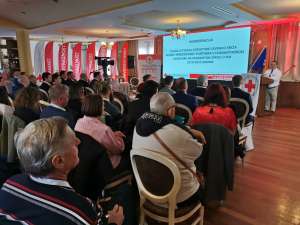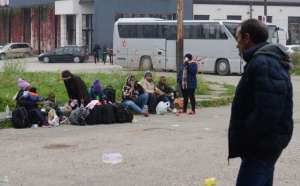LONDON / SARAJEVO, October 22 (FENA) - The situation with migrants in BiH is alarming as winter is approaching, and it is possible that we will face a serious humanitarian crisis. In addition, the current tendency to erect walls at borders and tighten security measures to prevent EU entry could only destabilize countries such as BiH, said Jelena Sesar, Amnesty International's Researcher for the Balkans and the European Union, based in London, in an interview with FENA.
Interview by: Bisera Džidić
“The need to close temporary center Miral in Velika Kladuša is of particular concern, as well as the fate of people currently accommodated there, but also of others who stay in various locations in Bihać and Velika Kladuša. In recent days, we have more and more information about the forcible transfer of people to the improvised Vučjak shelter, which is completely unsafe but also undignified for accommodating people,” said Sesar.
According to official data, there are currently over 6,000 migrants in BiH, most of them in the Una-Sana Canton but the actual number is probably much higher.
“The capacities of centers run by the International Organization for Migration (IOM) or state ministries are around 4,000, which leaves several thousand people without the accommodation and elementary support that BiH is obliged to provide. As we have already warned, the conditions in the existing centers in Bihać and Velika Kladuša are completely inadequate, but they provide shelter and minimal accommodation requirements,” Sesar stated.
Amnesty International also expresses the concern about the forced transfer of people to the improvised Vučjak shelter, which is located in an abandoned landfill and is at high risk of evaporating methane, which is toxic to human health.
“Hundreds of people currently placed in Vučjak do not even have basic living conditions - they sleep under tents, there is no running water, electricity or restrooms, and meals that are only given twice a day are extremely modest. The situation in Vučjak is completely unacceptable and below basic dignity. The European Commission and the UN have already warned about the conditions in the camp and have urged authorities to close it, and relocate people who are accommodated there to a more conditional place without delay, which we certainly support,” said Sesar.
Amnesty International believes that BiH authorities, especially the Ministry of Security, as well as both entity governments, must take responsibility for accommodating refugees and find adequate place in both entities.
“The authorities of the Una-Sana Canton have been shouldering this problem so far and it is unsustainable - there should be more solidarity throughout the country. This is an issue that cannot be escaped without resorting to measures that will inevitably threaten the rights of the people there because they are fleeing their countries due to conflict or poverty. Lack of funds cannot be an excuse. The European Commission has provided EUR 34 million so far for the care of refugees, but what is clearly lacking is support and cooperation between authorities at all levels, including the state and entity levels, to address this issue as a priority. Otherwise, thousands of lives will be seriously endangered in the coming months,” warns Sesar.
Amnesty International is of the opinion that, unlike in BiH, the neighboring countries have been able to manage the migrant crisis much better.
“Bosnia and Herzegovina is certainly not alone in this problem. Countries on the border of the European Union, especially Greece, Italy and even Bulgaria, have faced a large number of refugees in their territory. Serbia and Macedonia were in a similar position two years ago. Unlike BiH, these two countries have managed the situation much better. Like BiH, Serbia received significant funding and support from the European Union, but unlike BiH, the authorities in Serbia fully assumed the responsibility for accommodating and supporting refugees. This is not the case with us. What is happening in BiH is a state of complete disinterest and almost systemic negligence that can lead to an even bigger problem,” Sesar said, emphasizing that BiH has an obligation to provide accommodation and support to people who find themselves in its territory, while also respecting their basic rights.
According to her, the crisis in BiH is largely the result of forced deterrence and collective expulsion from Croatia.
“Amnesty International has already warned that what is happening on the borders of Croatia with BiH and Serbia is a violation of international law, but also of current European laws. Croatia is not the only European country that uses all its means to prevent entry into its territory. Similar violence has been taking place on the borders of Hungary and Bulgaria for years. Although the European Commission regularly warns these countries, the EU bears great responsibility for the current situation at its borders. So called migrant crisis is a direct consequence of a policy that has supported measures aimed at preventing new entry into the European Union for years,” said Sesar.
She said that the only way to stop illegal border-crossings in the long run, as well as violations of basic human rights, and better control of migration routes, is to reach an agreement at the European Union level that provides safe and legal ways to gain status, both refugee and migrant, for people fleeing war or poverty.
“The current tendency to erect walls at borders and tighten security measures to prevent EU entry has not only led to increased smuggling and opening of even more dangerous and risky routes, but also has created situations as we now have in BiH or Libya, countries outside the very borders of Schengen; countries that have shown that they are unwilling or unable to provide basic conditions for accommodating people, and providing them protection and support they have obliged to. Such policy could severely destabilize countries like BiH, but it also represents a threat to the EU future and questions the EU's commitment to the values and principles on which is based,” Jelena Sesar concluded in her interview.
(FENA) A. B.












